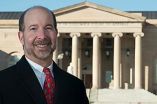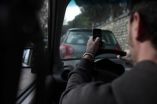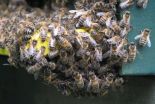(Press-News.org) We say that time flies, it marches on, it flows like a river — our descriptions of time are closely linked to our experiences of moving through space. Now, new research suggests that the illusions that influence how we perceive movement through space also influence our perception of time. The findings provide evidence that our experiences of space and time have even more in common than previously thought.
The research, conducted by psychological scientist Eugene Caruso of the University of Chicago Booth School of Business and colleagues, is published in Psychological Science, a journal of the Association for Psychological Science.
"It seemed to us that psychological scientists have neglected the important fact that, in everyday experience, people don't evaluate the past and the future in exactly the same way," says Caruso.
From research on spatial perception, we know that people feel closer to objects they are moving toward than those they are moving away from, even if the objects are exactly the same distance away. Because our perceptions of time are grounded in our experiences of space, Caruso and his colleagues hypothesized that the same illusion should influence how we experience time, resulting in what they call a temporal Doppler effect.
Surveying college students and commuters at a train station, the researchers found that people perceived times in the future (i.e., one month and one year from now) as closer to the present than equidistant times in the past (i.e., one month and one year ago).
Similarly, participants who completed an online survey one week before Valentine's Day felt that the holiday was closer to the present than those who were surveyed a week after Valentine's Day.
These findings hint at the relationship between movement in space and perceptions of time; to establish a direct link between the two, the researchers conducted a fourth study using a virtual reality environment.
Wearing a head-mounted display, college students were immersed in a scene with a two-lane road flanked by trees, streetlights, and buildings. Some of the students experienced the scene as though they were walking toward a bubbling fountain at the end of the road, whereas others felt as though they were walking backwards, away from the fountain. Later, the students reported how far away a date (three weeks in the future or three weeks in the past) felt to them.
Only those students who moved forward reported that the future felt closer than the past; students who experienced a mismatch between their movement (i.e., backward) and the direction of the event (i.e., future) showed no temporal Doppler effect.
These results confirm that our perceptions of time are grounded in our experiences of movement through space: We tend to feel closer to the future because we feel like we're moving toward it.
Caruso and colleagues argue that this orientation toward the future isn't merely a perceptual quirk; they believe it serves an important purpose. Humans haven't yet mastered the art of time travel, so we can't change the past. But we can prepare ourselves for the future; perceiving future events as closer may be a psychological mechanism that helps us to approach, avoid, or otherwise cope with the events we encounter.
The researchers hope to explore the functional aspects of the temporal Doppler effect in future experiments. For example, is the effect associated with healthy psychological functioning? Are people who show a reverse asymmetry — experiencing the past as closer than the future — more prone to negative outcomes like rumination and depression? Does eliminating the effect make us worse at creating plans and making decisions about the future?
According to Caruso, "this research is important because the idea of psychological distance is central to theory and research in every subfield of psychology — social, developmental, cognitive, clinical — yet there has been an implicit assumption that distance to the past is the same as distance to the future."
While philosophers may debate the directionality of time, these studies suggest that our subjective experience of time is clearly directional.
"Our work suggests instead that there is a systematic difference in people's perceptions of distance to the past and the future," Caruso concludes.
###
Co-authors on this research include Leaf Van Boven of the University of Colorado, Boulder and Mark Chin and Andrew Ward of Swarthmore College.
This research was supported by the Neubauer Family Faculty Fellows program, research funds from The University of Chicago Booth School of Business, and National Science Foundation Grants 0552120 and 1049125.
For more information about this study, please contact: Eugene M. Caruso at ecaruso@chicagobooth.edu.
The APS journal Psychological Science is the highest ranked empirical journal in psychology. For a copy of the article "The Temporal Doppler Effect: When the Future Feels Closer Than the Past" and access to other Psychological Science research findings, please contact Anna Mikulak. END
Events in the future seem closer than those in the past
New study suggests that people experience time as if they're moving toward the future and away from the past
2013-03-13
ELSE PRESS RELEASES FROM THIS DATE:
Study reveals 10 factors in wrongful conviction cases
2013-03-13
Why do innocent people go to jail in the United States every year for violent crimes they did not commit? It's a serious question representing the ultimate miscarriage of justice—taking away the freedom of a factually innocent person while also allowing the guilty person to remain free. The U.S. Department of Justice's National Institute of Justice (NIJ) wanted to learn answers to prevent wrongful convictions in the first place.
Jon B. Gould, J.D., Ph.D., a professor and the director of the Washington Institute for Public and International Affairs Research at American ...
Punishment can enhance performance, Nottingham academics find
2013-03-13
The stick can work just as well as the carrot in improving our performance, a team of academics at The University of Nottingham has found.
A study led by researchers from the University's School of Psychology, published recently in the Journal of Neuroscience, has shown that punishment can act as a performance enhancer in a similar way to monetary reward.
Dr Marios Philiastides, who led the work, said: "This work reveals important new information about how the brain functions that could lead to new methods of diagnosing neural development disorders such as autism, ADHD ...
Normal prion protein regulates iron metabolism
2013-03-13
An iron imbalance caused by prion proteins collecting in the brain is a likely cause of cell death in Creutzfeldt-Jakob disease (CJD), researchers at Case Western Reserve University School of Medicine have found.
The breakthrough follows discoveries that certain proteins found in the brains of Alzheimer's and Parkinson's patients also regulate iron. The results suggest that neurotoxicity by the form of iron, called redox-active iron, may be a trait of neurodegenerative conditions in all three diseases, the researchers say.
Further, the role of the normal prion protein ...
Ancient Chinese coin found on Kenyan island by Field Museum expedition
2013-03-13
A joint expedition of scientists led by Chapurukha M. Kusimba of The Field Museum and Sloan R. Williams of the University of Illinois at Chicago has unearthed a 600-year-old Chinese coin on the Kenyan island of Manda that shows trade existed between China and east Africa decades before European explorers set sail and changed the map of the world.
The coin, a small disk of copper and silver with a square hole in the center so it could be worn on a belt, is called "Yongle Tongbao" and was issued by Emperor Yongle who reigned from 1403-1425AD during the Ming Dynasty. The ...
Answering messages behind the wheel is as dangerous as being twice over the limit
2013-03-13
Scientists from various Australian universities in collaboration with the University of Barcelona have compared the effects of mobile use while driving with the effects of alcohol using a simulation. Their experiment demonstrates that using a handsfree kit or sending text messages is the same as being above the legal alcohol limit.
The Australian universities of Wollongong, Victoria, Swinburne of Technology, the Institute for breathing and sleep and the University of Barcelona have measured the reaction capacity behind the wheel of twelve healthy volunteers who participated ...
Immune cells cluster and communicate 'like bees,' researcher says
2013-03-13
The immune system's T cells, while coordinating responses to diseases and vaccines, act like honey bees sharing information about the best honey sources, according to a new study by scientists at UC San Francisco.
"In the morning, each bee goes looking individually for a sugar source, then comes back to the hive and does a dance in front of the other bees describing the location of what it's found, which helps the hive decide collectively where the best source is," said senior scientist Matthew Krummel, PhD, a UCSF professor of pathology.
They don't bust the same ...
UT study identifies ways children can meet recommended activity goals
2013-03-13
KNOXVILLE—Despite overwhelming evidence about the benefits of physical activity for children, most American youngsters are not meeting the federal recommendation of 60 minutes a day.
A new study by a team of University of Tennessee researchers has identified specific ways—and estimated minutes for each approach—that can help children achieve the recommended daily physical activity goal.
The results of various approaches, ranging from mandatory physical education in school to changes in playground designs, were published recently in the American Journal of Preventive ...
Polo takes the bait
2013-03-13
KANSAS CITY, MO—A seemingly obscure gene in the female fruit fly that is only active in cells that will become eggs has led researchers at the Stowers Institute for Medical Research to the discovery of a atypical protein that lures, traps, and inactivates the powerful Polo kinase, widely considered the master regulator of cell division. Its human homolog, Polo-like kinase-1 (Plk1), is misregulated in many types of cancer.
Stowers Investigator and senior author R. Scott Hawley, Ph.D., hopes that this highly selective kinase trap might give drug developers, who are working ...
Medicare spending for advanced cancer not linked to survival differences
2013-03-13
Substantial regional variation in Medicare spending for patients with advanced cancer is not linked to differences in survival, according to a study published March 12 in the Journal of the National Cancer Institute.
Cancer care accounts for approximately 10% of Medicare spending, and costs are highest for cancer patients with late-stage disease. Prior research studies have shown that there are large regional differences in spending within the Medicare program, however it is unknown if higher average regional spending for advanced cancer is linked to improved survival ...
Study: Brain imaging after mild head injury/concussion can show lesions
2013-03-13
SAN DIEGO – Brain imaging soon after mild traumatic brain injury (mTBI) or mild concussion can detect tiny lesions that may eventually provide a target for treating people with mTBI, according to a study released today and that will be presented at the American Academy of Neurology's 65th Annual Meeting in San Diego, March 16 to 23, 2013.
Studies of brain tissue once a person has died have shown that different types of lesions are associated with more severe TBI. "Our study suggests that imaging may be used to detect and distinguish between these lesions in a living ...
LAST 30 PRESS RELEASES:
AMS releases statement regarding the decision to rescind EPA’s 2009 Endangerment Finding
Parents’ alcohol and drug use influences their children’s consumption, research shows
Modular assembly of chiral nitrogen-bridged rings achieved by palladium-catalyzed diastereoselective and enantioselective cascade cyclization reactions
Promoting civic engagement
AMS Science Preview: Hurricane slowdown, school snow days
Deforestation in the Amazon raises the surface temperature by 3 °C during the dry season
Model more accurately maps the impact of frost on corn crops
How did humans develop sharp vision? Lab-grown retinas show likely answer
Sour grapes? Taste, experience of sour foods depends on individual consumer
At AAAS, professor Krystal Tsosie argues the future of science must be Indigenous-led
From the lab to the living room: Decoding Parkinson’s patients movements in the real world
Research advances in porous materials, as highlighted in the 2025 Nobel Prize in Chemistry
Sally C. Morton, executive vice president of ASU Knowledge Enterprise, presents a bold and practical framework for moving research from discovery to real-world impact
Biochemical parameters in patients with diabetic nephropathy versus individuals with diabetes alone, non-diabetic nephropathy, and healthy controls
Muscular strength and mortality in women ages 63 to 99
Adolescent and young adult requests for medication abortion through online telemedicine
Researchers want a better whiff of plant-based proteins
Pioneering a new generation of lithium battery cathode materials
A Pitt-Johnstown professor found syntax in the warbling duets of wild parrots
Cleaner solar manufacturing could cut global emissions by eight billion tonnes
Safety and efficacy of stereoelectroencephalography-guided resection and responsive neurostimulation in drug-resistant temporal lobe epilepsy
Assessing safety and gender-based variations in cardiac pacemakers and related devices
New study reveals how a key receptor tells apart two nearly identical drug molecules
Parkinson’s disease triggers a hidden shift in how the body produces energy
Eleven genetic variants affect gut microbiome
Study creates most precise map yet of agricultural emissions, charts path to reduce hotspots
When heat flows like water
Study confirms Arctic peatlands are expanding
KRICT develops microfluidic chip for one-step detection of PFAs and other pollutants
How much can an autonomous robotic arm feel like part of the body
[Press-News.org] Events in the future seem closer than those in the pastNew study suggests that people experience time as if they're moving toward the future and away from the past



